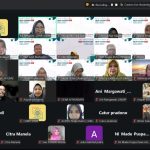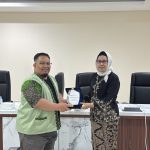Wednesday (21/6), the Center for Medical Bioethics and Humanities held the Raboan Discussion Forum. The topic that we raised was Patient Preference VS Family Preference in Palliative Care. The speaker for this discussion was Dr. Christantie Effendy, S.Kp., M.Kes. and moderated by dr. Galuh Dyah Fatmala.

The family in Indonesia is consists of extended family, so making decisions cannot be based on personal preferences. Elderly people in Indonesia are often not the important to have the opportunity to express their opinions, as they are perceived as lacking competence in decision-making.
Patient is a person who is waiting for or undergoing medical treatment and care. The word patient comes from a Latin word meaning to suffer or to bear. Traditionally, the person receiving health care has been called a patient. A client is a person who engages the advice or services of another who is qualified to provide this service. The term client presents the receivers of health care as collaborators in the care, that is, as people who are also responsible for their own health.
Promoting Patient centred care from diagnosis to end of life requires a better understanding of physical, psychological, social, and spiritual coping factors in advanced cancer. PCC makes the client and his or her family an integral part of the care team, and as such they collaborate with health-care professionals in the decisions that impact on the care that they receive.
8 dimensions of patient centered care:
- Patient preferences: There is a need to be honest about the patient’s illness and educate them so they can actively participate in deciding the best solution for their disease.
- The Role of Healthcare Workers
- The concept of family caregivers: Sometimes because they really love patient, many relatives does not ask about the patient’s opinion, assuming that the best decisions should come from the family.
- The concept of decision-making autonomy: In challenging disease situations where a cure is difficult to do, the patient should be given the opportunity to express their desires and make decisions together.
- Ethical Dilemma
- Advance Care Planning
The communication gap can make patients more stressed because they don’t know what illness they have or how long the treatment will take. Proper communication with patients must be carried out so that we understand the patient’s wishes and level of understanding. There are still difficulties for healthcare workers to convey bad news to patients about their health condition. The COVID-19 phenomenon has caused a change in attitude towards sharing sad news, so the patient’s family no longer considers painful facts about the patient as taboo.The phases of the palliative care pathway :
- The first phase : when diagnosed
- The middle phase : constituted the time between the early phase and the terminal phase
- The terminal phase : comprised the last weeks and days before death
Palliative home-based care is a good choice for patients because the best indicator of the end of life is when they pass away peacefully at home. But healthcare workers still need to monitor the progress of the condition of patients being treated at home.
Five levels of involvement:
- Contributing to action sequences
- Influencing the problem definition
- Sharing the reasoning process
- Influencing decision making
- Experiencing emotional reciprocity
4 boxes method – Facilitating ethical and legal practice:
- Clinical indications: Sort out which therapies are still effective and which are no longer effective.
- Patient preferences: Involve the patient in deciding something related to their life.
- Quality of life: The patient’s wishes for food/activity need to be aware because it can help patient to be more enthusiastic about maintaining good health (provided it is monitored).
- Contextual features: Are there any external factors that affect the patient’s mental well-being?
A Seven Step Model
- Determine the facts.
- Define the precise ethical issue.
- Identify the major principles, rules, and values.
- Specify the alternatives.
- Compare values and alternatives.
- Assess the consequences.
- Make a decision.
Writer: Safirra Afifah Firanka
Watch full video here






